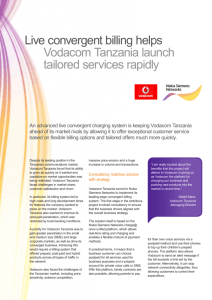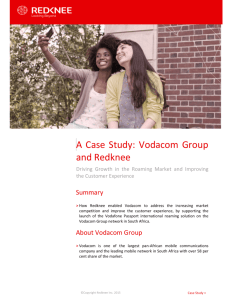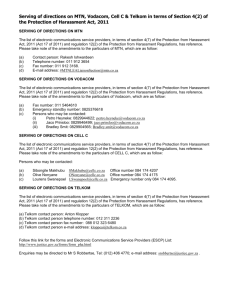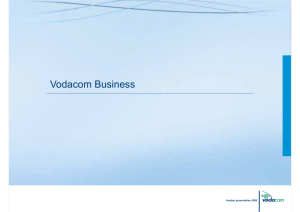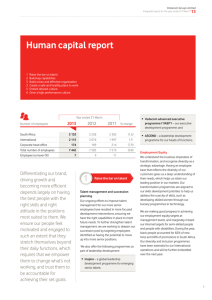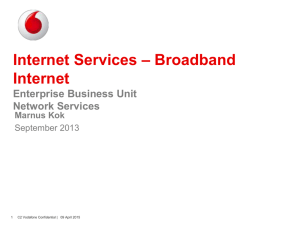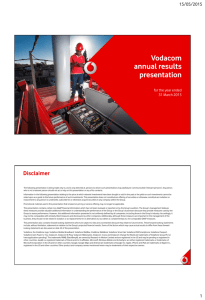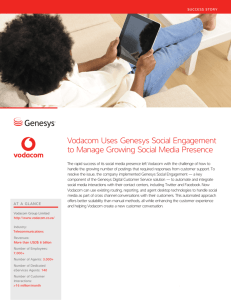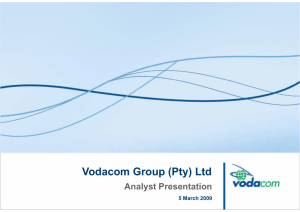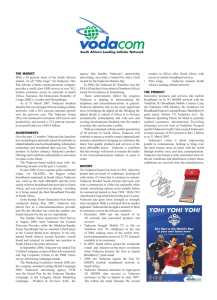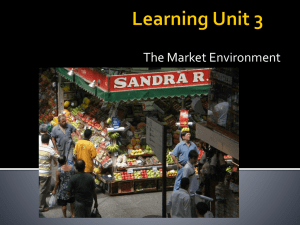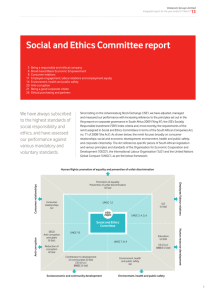Vodacom South Africa: Leader of mobile broadband
advertisement
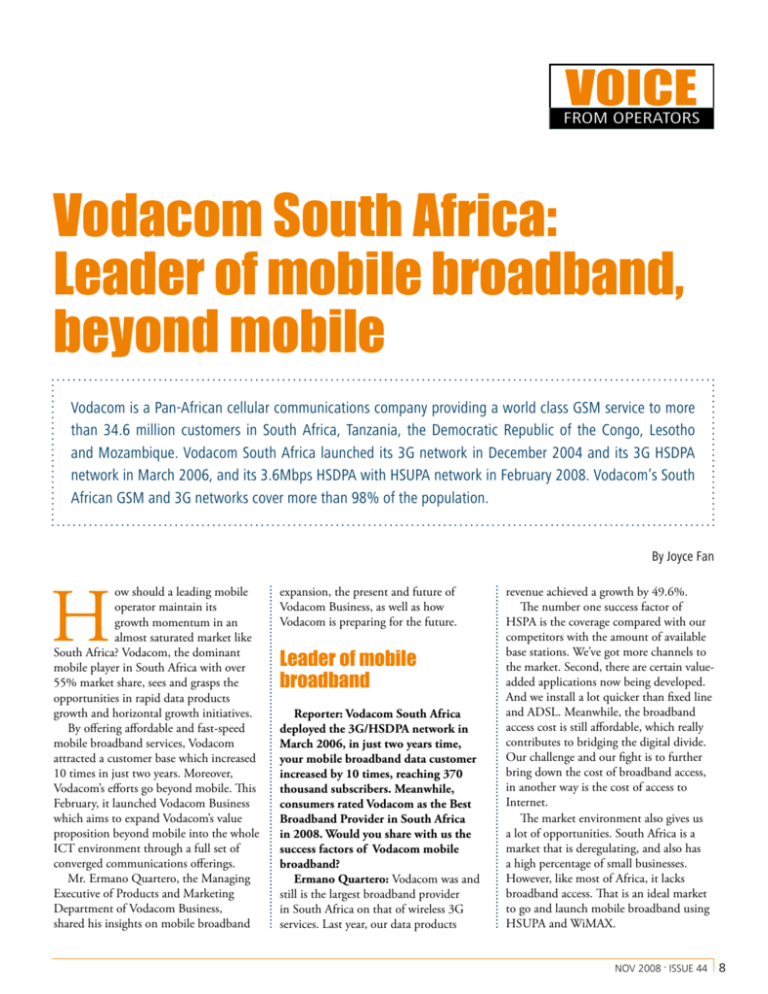
VOICE FROM OPERATORS Vodacom South Africa: Leader of mobile broadband, beyond mobile Vodacom is a Pan-African cellular communications company providing a world class GSM service to more than 34.6 million customers in South Africa, Tanzania, the Democratic Republic of the Congo, Lesotho and Mozambique. Vodacom South Africa launched its 3G network in December 2004 and its 3G HSDPA network in March 2006, and its 3.6Mbps HSDPA with HSUPA network in February 2008. Vodacom’s South African GSM and 3G networks cover more than 98% of the population. By Joyce Fan H ow should a leading mobile operator maintain its growth momentum in an almost saturated market like South Africa? Vodacom, the dominant mobile player in South Africa with over 55% market share, sees and grasps the opportunities in rapid data products growth and horizontal growth initiatives. By offering affordable and fast-speed mobile broadband services, Vodacom attracted a customer base which increased 10 times in just two years. Moreover, Vodacom’s efforts go beyond mobile. This February, it launched Vodacom Business which aims to expand Vodacom’s value proposition beyond mobile into the whole ICT environment through a full set of converged communications offerings. Mr. Ermano Quartero, the Managing Executive of Products and Marketing Department of Vodacom Business, shared his insights on mobile broadband expansion, the present and future of Vodacom Business, as well as how Vodacom is preparing for the future. Leader of mobile broadband Reporter: Vodacom South Africa deployed the 3G/HSDPA network in March 2006, in just two years time, your mobile broadband data customer increased by 10 times, reaching 370 thousand subscribers. Meanwhile, consumers rated Vodacom as the Best Broadband Provider in South Africa in 2008. Would you share with us the success factors of Vodacom mobile broadband? Ermano Quartero: Vodacom was and still is the largest broadband provider in South Africa on that of wireless 3G services. Last year, our data products revenue achieved a growth by 49.6%. The number one success factor of HSPA is the coverage compared with our competitors with the amount of available base stations. We’ve got more channels to the market. Second, there are certain valueadded applications now being developed. And we install a lot quicker than fixed line and ADSL. Meanwhile, the broadband access cost is still affordable, which really contributes to bridging the digital divide. Our challenge and our fight is to further bring down the cost of broadband access, in another way is the cost of access to Internet. The market environment also gives us a lot of opportunities. South Africa is a market that is deregulating, and also has a high percentage of small businesses. However, like most of Africa, it lacks broadband access. That is an ideal market to go and launch mobile broadband using HSUPA and WiMAX. NOV 2008 . ISSUE 44 8 VOICE FROM OPERATORS [ Based on our experience and operation outside South Africa, I think the success factors of Vodacom HSPA are equally applicable in other African countries. Vodacom has got affiliate companies operation in Kenya, Ghana, Mozambique, DRC, Tanzania, and Lesotho. The evidence that Vodacom operation outside South Africa also provides 3G voice and HSPA services successfully shows that the success in South Africa would be carried into other geography. Reporter: From the technological point of view, mobile broadband can be realized through either HSPA or WiMAX, and we know Vodacom uses both two technologies. Then, how do you comment the similarity and difference between WiMAX and HSPA? Ermano Quartero: HSUPA and WiMAX probably offer the same speeds. In South Africa, HSUPA offers a higher speed than WiMAX. People are saying that why I should have WiMAX if I’ve got a mobile equivalent. Small Businesses and corporate customers who want to have Voice over IP and access need a reliable and consistent service. Although WiMAX is more expensive, and is more complex to deploy, but once it’s been deployed it will be more reliable. That’s why we feel that WiMAX is for the business consumers and HSUPA is a kind of broadband for consumers of individual users. So that is what we see the difference. Beyond mobile Reporter: We know that Vodacom launched Vodacom Business this February. Can you explain the market opportunity underlying this business initiative? And what’s the strategic aim of this division? Ermano Quartero: Vodacom has initially been a mobile operator. In the South Africa market, the mobile penetration ratio is reaching the saturation point. We need to look for growth opportunities before the market has saturated. So we explored an 9 NOV 2008 . ISSUE 44 [ We will focus on the more traditional IP space, to provide Internet access, and provide datacom services. So it is going to expand Vodacom’s value proposition beyond mobile into the whole ICT environment. initiative to expand our offering horizontally to catch more calls, the data and the ISP space. Essentially what Vodacom Business does is a new division of Vodacom to focus on non-mobile businesses. We are going to focus on the more traditional IP space, to provide Internet access, and provide datacom services. So it is going to expand Vodacom’s value proposition beyond mobile into the whole ICT environment. Initially, Vodacom Business aims at the corporate clients and SMEs. All the product will be developed and aimed at corporate and enterprises. But we can both use them for the SME market before we enter the enterprise. And then, in time, we will tackle the home market, the consumer market. But the initial strategy of Vodacom Business is the corporate market and small business market. Reporter: Can you briefly describe the current service portfolio of Vodacom Business? Ermano Quartero: The current portfolio is set up into four kinds of service. The first kind of service we call it Access Services and that business unit focuses on the connectivity into the Vodacom network. So we are providing fiber access, WiMAX, ADSL, microwave and satellite connectivity. Then we see the other three services, one is the group services called Managed Network Services. It will provide high-quality first-tier Internet and managed network services to businesses. Services like ISP solutions, VPN and Voice over IP are all together in this one portfolio service. The third one is what we call Hosted Services. We basically launch the data center, security services and hosting services all in that one. The forth one is what we call Application Services. The services are inside the data center that all services that customer consume about the application, say markets of shipment, portals, Google X. We will be hosting SAP, and we will be hosting Oracle for our customers. So those are all the four products and services that we came into the market. Reporter: How do you promote the new a lot of base stations. But when it’s all connected to the core network, we don’t have our own backbone to carry the traffic. Two cables that connect Africa to the rest of the world are very expensive and saturated. We’ve got a very aggressive plan to roll up the fiber-optic cables in South Africa. There are three new cable systems being deployed right now. Two cables are on the east coast, and one cable is on the west coast. And Vodacom is participating in most cable systems. When the backbone is our own backbone, we can really turn on high speed of access, and then the data traffic will surpass the voice traffic. It not only brings more capacities to South Africa, but makes it more affordable for South Africa’s broadband access. Whether it is in South Africa, whether it is in Nigeria, whether it is in Ghana, we can bring that cost down which can bridge that digital divide. Mr. Ermano Quartero, the Managing Executive of Products and Marketing Department of Vodacom Business services to the target customers? And how is the market acceptance so far? Ermano Quartero: We are fortunate that Vodacom has got a very large customer base already. In the mobile business that we are the leader in South Africa with about 54% market shares. So we are calling on our existing customers that on our mobile services to sell our whole range of other services, convergent solutions etc. So we focus primarily on our existing customers, we also run strong market campaigns; we have gone on a very large launch. We invite corporate customers come to our premises and we present to them and we also retrained ourselves. We just launched the services two months ago. The market is taking them very well. We are hoping that in the next six months we will sign up with several corporate customers. Infrastructure support Reporter: Vodafone Group predicts that the traffic carried on Vodafone’s network by voice will be surpassed by that of data sometime in 2008. When do you think this will happen for Vodacom? And how will you prepare to handle the data traffic surge? Ermano Quartero: I think the critical moment is going to be 6 or 8 months away when we launch HSDPA 7.2Mbps and build our own backbone. The hindrance right now for providing high speed capacity is the backbone. The radio access network is fine, as we have Reporter: South Africa will host the 2010 FIFA World Cup. As the leading mobile operator, how will you prepare to support this event and showcase your advanced services to the world? Ermano Quartero: Our plan is to put down a lot more infrastructures ahead of the World Cup, so that we can provide more reliable services and support highspeed capacity. We are building the fiberoptic network already, and it will be ready before the World Cup. With great flexibility, we just add capacity as we need as we bring more customers. The other plan is to increase the coverage capacity around all stadiums, around all the major areas, and we work very closely with the Tourism Board to provide Vodacom branding and Vodacom wireless hotspots in all the hospitality establishments. We are also working with some of the key hospitality services to provide on-line bookings and also going to provide WiMAX services to tourists that come to South Africa. Also we rely heavily on Vodafone, because all the tourists that come to Africa we want them run on our GSM network. So there is going to be a lot of technology deployment to make sure when the customers come, we are their first choice. Editor: Gao Xianrui sally@huawei.com NOV 2008 . ISSUE 44 10
